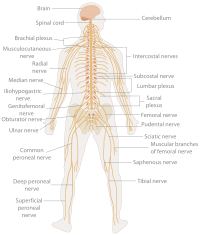
Photo from wikipedia
Pleomorphic rhabdomyosarcoma (PRMS) predominantly arises in adult skeletal musculature and is usually associated with poor prognosis. Thus, effective treatments must be developed. PRMS is a rare tumor; therefore, it is… Click to show full abstract
Pleomorphic rhabdomyosarcoma (PRMS) predominantly arises in adult skeletal musculature and is usually associated with poor prognosis. Thus, effective treatments must be developed. PRMS is a rare tumor; therefore, it is critical to develop an experimental system to understand the cellular and molecular mechanisms of PRMS. We previously demonstrated that PRMS develops after p53 gene deletion and oncogenic K-Ras expression in the skeletal muscle tissue. In that study, oncogenic K-Ras-expressing cells were diverse and the period until disease onset was difficult to control. In this study, we developed an experimental system to address this problem. Single cell-derived murine cell lines, designated as RMS310 and RMSg2, were established by limiting the dilution of cells from a lung metastatic tumor colony that were positive for various cancer stem cells and activated skeletal muscle-resident stem/progenitor cell marker genes by RT-PCR. All cell lines stably recapitulated the histological characteristics of human PRMS as bizarre giant cells, desmin-positive cells, and lung metastases in C57BL/6 mice. All subclones of the RMSg2 cells by the limiting dilution in vitro could seed PRMS subcutaneously, and as few as 500 RMSg2 cells were sufficient to form tumors. These results suggest that the RMSg2 cells are multipotent cancer cells that partially combine the properties of skeletal muscle-resident stem/progenitor cells and high tumorigenicity. Thus, our model system's capacity to regenerate tumor tissue in vivo and maintain stable cells in vitro makes it useful for developing therapeutics to treat PRMS.
Journal Title: Experimental animals
Year Published: 2023
Link to full text (if available)
Share on Social Media: Sign Up to like & get
recommendations!